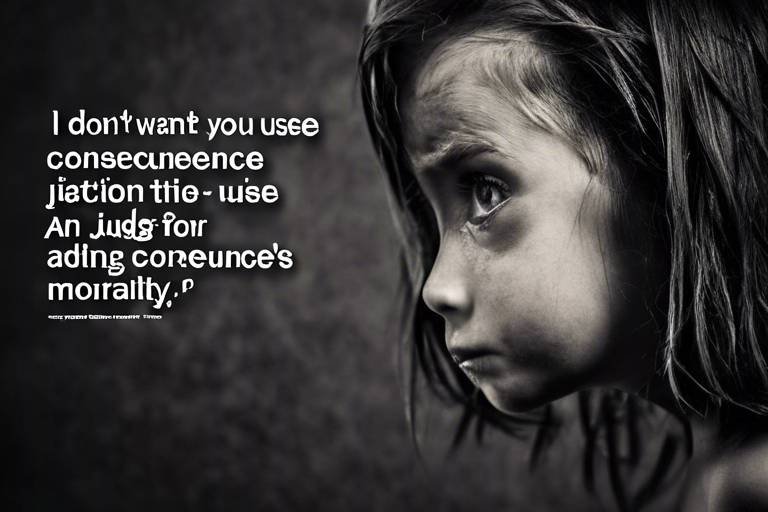Are Innocent Lies Morally Acceptable?
When we think about lies, our minds often jump to the worst-case scenarios—betrayal, deceit, and manipulation. But what if I told you that not all lies are created equal? In fact, some lies, often dubbed "innocent lies," can be seen as harmless or even beneficial. These are the little white lies we tell to spare someone's feelings or to avoid unnecessary conflict. But the question remains: To navigate this complex moral landscape, we need to explore the nuances of what constitutes an innocent lie and the various contexts in which they arise.
At first glance, it might seem straightforward. An innocent lie could be something as simple as telling a friend that their new haircut looks great when, in reality, it might not be your favorite look. However, as we dig deeper, we uncover layers of ethical implications. Are these lies justifiable if they prevent hurt feelings? Or do they set a dangerous precedent where dishonesty becomes normalized? By examining the ethical dimensions of innocent lies, we can better understand their potential benefits and harms.
In this exploration, we will delve into philosophical perspectives that shed light on the morality of lying. From consequentialism, which evaluates the outcomes of our actions, to deontology, which emphasizes moral rules and duties, different theories provide varied insights into whether innocent lies can ever be justified. Moreover, we will consider the role of intent behind these lies, as well as their impact on trust and relationships. Ultimately, we aim to answer whether innocent lies can coexist with a commitment to honesty in our everyday lives.
As we navigate through this discussion, it's crucial to remember that the context surrounding a lie often shapes its moral standing. In some situations, an innocent lie might serve to protect someone's feelings or maintain harmony. In others, it could lead to misunderstandings or a breakdown of trust. Therefore, the question of whether innocent lies are morally acceptable is not just about the act of lying itself, but also about the broader implications of those lies in our social fabric.
- What is an innocent lie? An innocent lie is a falsehood told with good intentions, often to avoid hurting someone's feelings or to maintain social harmony.
- Are there any benefits to telling innocent lies? Yes, innocent lies can sometimes prevent unnecessary conflict, protect someone's feelings, or create a more pleasant social atmosphere.
- Can innocent lies harm relationships? While innocent lies may seem harmless, they can lead to a breakdown of trust if discovered, complicating relationships.
- How do different cultures view innocent lies? Cultural perspectives on lying vary; some cultures may accept innocent lies as a social norm, while others prioritize honesty above all.

The Nature of Innocent Lies
Understanding what constitutes an innocent lie is essential in navigating the complex landscape of morality. At its core, an innocent lie is often defined as a falsehood told without the intent to harm. Unlike malicious deception, which aims to mislead for personal gain or to inflict damage, innocent lies are usually motivated by a desire to protect feelings or maintain social harmony. For example, telling a friend that their new haircut looks great, even if you think otherwise, is typically considered an innocent lie. This kind of lie aims to spare someone's feelings and avoid unnecessary discomfort.
Context plays a critical role in how these lies are perceived. A lie that is deemed innocent in one situation may be viewed as deceitful in another. For instance, consider a scenario where a parent tells their child that a deceased pet is "sleeping" rather than explaining the harsh reality of death. In this situation, the intent is to shield the child from pain, but the implications of the lie can lead to complications down the line. Thus, the boundaries of what we classify as an innocent lie can shift dramatically based on the surrounding circumstances and the relationships involved.
To further illustrate the nature of innocent lies, we can break them down into several key characteristics:
- Intent: The primary motive behind the lie is usually benevolent, aimed at protecting someone’s feelings or avoiding conflict.
- Outcome: The results of telling an innocent lie often lead to less harm than telling the truth, at least in the short term.
- Perception: Society often views innocent lies more favorably than malicious lies, considering them a necessary part of social interaction.
Moreover, innocent lies can serve as social lubricants, easing interactions and fostering a sense of camaraderie. They can help maintain relationships by avoiding unnecessary confrontations and allowing individuals to navigate tricky social waters. However, this raises a pertinent question: at what point does an innocent lie cross the line into something more harmful? The delicate balance between honesty and kindness is a tightrope walk that many individuals face daily.
In summary, the nature of innocent lies is multifaceted and deeply intertwined with human relationships. While they may seem harmless on the surface, the ethical implications can be complex and far-reaching. As we explore the philosophical perspectives on lying, it's crucial to keep in mind the various dimensions of innocent lies and their potential impact on both individuals and society as a whole.

Philosophical Perspectives on Lying
When we dive into the philosophical waters surrounding the concept of lying, we find ourselves navigating through a complex sea of ethical theories and moral dilemmas. Different philosophical traditions offer various lenses through which we can examine the morality of lies, particularly those deemed "innocent." It's fascinating how a single act, like telling a white lie, can evoke such varied interpretations based on the ethical framework one subscribes to. So, what are these frameworks, and how do they shape our understanding of innocent lies?
One major school of thought is consequentialism, which posits that the morality of an action is determined by its outcomes. In this view, innocent lies can be justified if they lead to positive results. For instance, consider a scenario where a friend is anxious about a performance. If you tell them they look great to boost their confidence, a consequentialist would argue that the positive outcome of increased self-esteem outweighs the act of lying itself. However, this raises questions about the potential for moral relativism, where the ends justify the means, potentially leading to a slippery slope of justifying harmful lies under the guise of good intentions.
On the flip side, we encounter deontological ethics, which emphasizes adherence to moral rules and duties. From this perspective, lying is inherently wrong, regardless of the potential benefits it may bring. Deontologists argue that the act of lying undermines trust and can have far-reaching implications, even if the lie seems harmless in the moment. They might contend that honesty should be upheld as a fundamental principle, and any deviation from that principle, even for innocuous reasons, is a moral failing. This creates a compelling tension between the desire to protect someone's feelings and the obligation to be truthful.
Adding another layer to this discussion is virtue ethics, which focuses on the character of the individual rather than the rules or consequences. According to virtue ethicists, the morality of innocent lies hinges on the virtues or vices that the act reflects. If a lie stems from compassion and a desire to protect someone, it could be seen as virtuous. However, if it arises from cowardice or a lack of integrity, it could be viewed as a moral failing. This perspective invites us to consider not just the act of lying itself but the kind of person we aspire to be in our interactions with others.
In summary, the philosophical perspectives on lying present a rich tapestry of thought. Whether through the lens of consequentialism, deontology, or virtue ethics, the debate over innocent lies challenges us to reflect on our values and the implications of our actions. Each framework offers valuable insights, prompting us to ask ourselves: What is the greater good? and What kind of person do we want to be? As we navigate these philosophical waters, it becomes clear that the ethics of lying are as intricate as the human experience itself.

Consequentialist Viewpoints
When we dive into the realm of consequentialism, we find ourselves evaluating the morality of actions based on their outcomes rather than their intrinsic qualities. This perspective raises a fascinating question: can an innocent lie ever be justified if it leads to a greater good? For many consequentialists, the answer is a resounding yes. They argue that if a lie brings about positive consequences—such as happiness, safety, or well-being—then it can be considered morally acceptable.
Consider a scenario where a parent tells their child that their beloved pet is simply sleeping when, in reality, it has passed away. The intention behind this innocent lie is to shield the child from the pain of loss. In this case, the parent believes that the emotional distress caused by the truth outweighs the benefits of honesty. From a consequentialist viewpoint, the lie serves a greater purpose: it preserves the child's innocence and emotional stability, at least in the short term.
However, the waters get murky when we start to analyze the broader implications of such lies. While some might argue that innocent lies can foster peace and happiness, others raise concerns about the potential for slippery slopes. If we justify one innocent lie, does it open the floodgates for more significant deceptions? For instance, what if a government official lies about a minor issue to maintain public calm during a crisis? The initial intent might be to protect citizens, but the long-term consequences could lead to a breakdown of trust in leadership.
To illustrate the complexity of this issue, let’s break it down into key points:
- Positive Outcomes: Innocent lies that lead to happiness or safety can be seen as justified.
- Intent vs. Consequence: The intention behind the lie plays a crucial role, but the impact can sometimes be unpredictable.
- Trust Issues: Frequent innocent lies can erode trust over time, leading to skepticism and doubt.
Ultimately, the consequentialist viewpoint challenges us to weigh the benefits against the potential harms of innocent lies. It asks us to consider not just the immediate effects but also the long-term ramifications on relationships, trust, and societal norms. As we navigate through life, we must remain vigilant about the lies we tell, even if they are born from a place of good intentions. Are we truly helping others, or are we merely postponing a necessary truth?

Utilitarianism and Innocent Lies
Utilitarianism, a prominent branch of consequentialism, posits that the morality of an action is determined by its contribution to overall happiness or utility. When we apply this principle to the concept of innocent lies, we find ourselves navigating a complex moral landscape. Imagine a scenario where a friend asks for your opinion on an outfit that doesn’t quite suit them. You could tell them the truth, potentially hurting their feelings, or you could offer a gentle, albeit innocent lie, suggesting that it looks great. In this case, the lie might serve to protect their self-esteem and maintain the harmony of your friendship. This raises a crucial question: can innocent lies be justified if they lead to greater happiness?
Utilitarianism encourages us to weigh the outcomes of our actions, and in many instances, innocent lies can tip the scales toward a more favorable result. Here are a few considerations that highlight how innocent lies might align with utilitarian principles:
- Preservation of Relationships: Innocent lies can help safeguard friendships and family bonds. By sparing someone’s feelings, we may foster a more positive environment where trust and affection thrive.
- Emotional Support: Sometimes, people need a little boost to get through tough times. An innocent lie can provide the encouragement they need to face challenges, ultimately leading to a happier, more resilient individual.
- Social Cohesion: In certain social situations, innocent lies can help maintain group harmony. For instance, telling a white lie during a surprise party planning can enhance the joy of the event without causing harm.
However, the application of utilitarianism to innocent lies is not without its pitfalls. Critics argue that relying solely on the outcomes of actions can lead to moral dilemmas where the ends justify the means, potentially fostering a slippery slope of deceit. For instance, if we start justifying innocent lies today, could that pave the way for more significant, harmful lies tomorrow? This concern is particularly relevant in contexts where trust is paramount, such as in personal relationships or professional settings.
Moreover, the challenge lies in accurately predicting the outcomes of our lies. What may seem like a harmless fib in the moment could lead to unintended consequences down the line. For example, if someone lies about their feelings to avoid conflict, the truth may eventually surface, resulting in more significant emotional fallout than if the truth had been shared upfront.
In conclusion, while utilitarianism provides a compelling framework for evaluating the morality of innocent lies, it also invites us to tread carefully. Balancing the immediate benefits of a lie against the potential long-term repercussions requires a nuanced understanding of human relationships and the intricate web of emotions that bind us. Ultimately, the question remains: when is it truly acceptable to tell an innocent lie for the greater good?
- What is an innocent lie? An innocent lie is a falsehood told without malicious intent, often to protect someone's feelings or to avoid unnecessary conflict.
- Can innocent lies ever be harmful? Yes, while innocent lies may seem harmless at first, they can lead to complications or mistrust if discovered later.
- How do different cultures view innocent lies? Cultural attitudes towards lying vary significantly; some cultures may view innocent lies as acceptable social lubricants, while others may strictly condemn any form of deception.
- Is it better to tell the truth or an innocent lie? This depends on the context and potential consequences; weighing the emotional impact on the person receiving the information is crucial.

Critiques of Consequentialism
While consequentialism provides a compelling framework for evaluating the morality of actions based on their outcomes, it is not without its critics. One of the primary concerns is that this approach can lead to **moral relativism**, where the distinction between right and wrong becomes blurred. If the morality of an action is solely determined by its consequences, then actions traditionally seen as unethical could be justified if they lead to favorable outcomes. For instance, consider a scenario where a lie is told to protect someone's feelings. While the immediate result may be positive, the underlying principle of honesty is compromised, raising the question: at what cost does this lie come?
Furthermore, critics argue that consequentialism often overlooks the importance of **intentions** behind actions. The idea that the end justifies the means can lead to a slippery slope where individuals may feel justified in engaging in increasingly questionable behavior, as long as they believe the results will be beneficial. This perspective can foster a culture where deceit is normalized, ultimately undermining trust in personal relationships and society at large.
Additionally, the **predictive nature** of consequentialism poses another critique. It assumes that individuals can accurately foresee the outcomes of their actions. However, life is inherently unpredictable, and well-meaning actions can lead to unintended consequences. For example, an innocent lie intended to spare someone's feelings might inadvertently lead to a breakdown in communication or a loss of trust if the truth eventually emerges. This unpredictability complicates the moral landscape, making it challenging to assess the righteousness of an action based solely on its outcomes.
Moreover, consequentialism tends to prioritize collective happiness over individual rights. This raises ethical dilemmas, particularly when the happiness of the majority comes at the expense of a minority. For example, if a community decides to lie about the safety of a product to boost sales, the collective gain might overshadow the harm inflicted on those who rely on the product for their well-being. Such scenarios highlight the potential for **injustice** within a consequentialist framework, where the needs and rights of individuals can be overlooked in favor of the greater good.
In summary, while consequentialism offers valuable insights into the morality of actions based on their outcomes, it also presents significant challenges. Critics highlight the risks of moral relativism, the importance of intentions, the unpredictability of consequences, and the potential for injustice. As we navigate the complex landscape of ethics, it becomes evident that a more nuanced approach may be necessary to fully understand the implications of innocent lies and their place in our moral framework.
- What are innocent lies? Innocent lies are falsehoods told with good intentions, often to protect someone's feelings or avoid unnecessary conflict.
- Can innocent lies ever be justified? The justification for innocent lies often depends on the context and the potential outcomes. Some ethical frameworks, like consequentialism, may support them if they lead to positive results.
- What are the potential downsides of innocent lies? Innocent lies can lead to a breakdown of trust, unintended consequences, and ethical dilemmas, particularly if the truth eventually comes to light.
- How do different cultures view innocent lies? Cultural norms significantly influence the acceptance of innocent lies, with some societies viewing them as a necessary social lubricant, while others may condemn any form of deception.

Deontological Perspectives
When we dive into the realm of deontological ethics, we're stepping into a world where the rules matter more than the outcomes. Deontology, derived from the Greek word "deon," meaning "duty," posits that certain actions are inherently right or wrong, regardless of their consequences. This ethical framework, championed by philosophers like Immanuel Kant, emphasizes that lying is fundamentally immoral. For deontologists, the act of lying violates a moral duty to be truthful, which they believe is essential for maintaining trust and integrity in society.
One of the core tenets of deontological thought is the idea of universalizability. This principle suggests that if one person can lie, then everyone should be allowed to lie under similar circumstances. However, if lying were universally acceptable, the very concept of truth would begin to erode, leading to a society where trust is compromised. Imagine a world where you could never be sure if someone is being honest with you. Wouldn’t that create an atmosphere of suspicion and anxiety? Deontologists argue that this potential breakdown of trust is a compelling reason to uphold the moral prohibition against lying, even if the lie is considered "innocent."
Moreover, deontologists often highlight the significance of intent behind actions. For them, the intention behind a lie—no matter how benign—doesn't absolve the liar from the moral implications of their action. They argue that even innocent lies can set a dangerous precedent, leading individuals to justify more significant deceptions down the line. Consequently, the slippery slope of moral relativism is a major concern for deontologists, who believe that adhering to strict moral guidelines is essential for ethical integrity.
In practice, this perspective raises intriguing questions about the nature of innocent lies. For instance, consider a scenario where a parent tells their child that a beloved pet has gone to "a better place" rather than explaining the harsh reality of death. While the intent is to protect the child from emotional pain, a deontologist would argue that the parent has still failed in their moral duty to be truthful. This tension between protecting loved ones and adhering to moral principles is a classic dilemma faced by those who subscribe to deontological ethics.
Ultimately, while deontologists recognize the emotional weight behind innocent lies, they maintain that moral integrity must prevail. The challenge lies in navigating the complex landscape of ethics, where the desire to shield others from harm often conflicts with the unwavering commitment to truthfulness. This perspective invites us to ponder: can we ever justify an innocent lie without undermining our moral fabric? Or must we always strive to uphold honesty, no matter the circumstances?
- What is deontology?
Deontology is an ethical framework that emphasizes the importance of following moral rules and duties, regardless of the consequences of one's actions. - Why do deontologists believe lying is wrong?
Deontologists argue that lying undermines trust and violates a moral duty to be truthful, which is essential for a functioning society. - Can innocent lies ever be justified?
From a deontological perspective, innocent lies cannot be justified as they still violate the fundamental principle of honesty. - What is the difference between deontology and consequentialism?
Deontology focuses on the morality of actions themselves, while consequentialism evaluates actions based on their outcomes.

The Role of Intent in Lying
When we delve into the murky waters of lying, one of the most critical factors to consider is intent. Why did someone choose to lie? Was it out of a desire to protect someone’s feelings, or was it to manipulate or deceive for personal gain? The intent behind a lie can dramatically shift its ethical standing. For instance, a parent telling a child that a beloved pet has gone to a "better place" rather than explaining the harsh reality of death is often seen as a protective measure. In this case, the intent is to shield the child from pain, which many would argue makes the lie more acceptable.
However, intent isn't always so clear-cut. Consider a scenario where a friend lies about their financial situation to avoid judgment. Here, the intent might stem from a place of insecurity, but the impact could lead to a breakdown of trust if the truth comes out. This complexity raises an important question: Can good intentions always justify a lie? The answer is not as straightforward as one might hope.
To further illustrate this point, let’s look at a few examples of innocent lies and their intents:
- Protective Lies: A person may lie to prevent someone from feeling hurt or anxious. For instance, telling a friend that they look great in an outfit, even if you think otherwise, can be seen as a way to boost their confidence.
- Social Lies: These are often referred to as "white lies." They can include telling someone you enjoyed a meal when you didn’t, simply to avoid hurting the cook's feelings.
- Self-Preservation Lies: Sometimes, individuals lie to protect themselves from social stigma or judgment, such as claiming to have a job when they are unemployed.
The distinction between intent and impact is crucial in these instances. While the intent may be innocent, the impact of the lie can lead to unintended consequences. For example, if the protective lie about a friend’s appearance becomes a habit, it may lead to a situation where the friend feels misled or loses trust in the relationship. Hence, it’s essential to weigh both sides carefully.
In the end, while intent plays a significant role in determining the morality of a lie, it’s also vital to consider the context and potential impact. The same lie can be perceived differently depending on the circumstances surrounding it. This complexity highlights the intricate dance between honesty and compassion in human interactions. So, next time you find yourself on the verge of telling an innocent lie, pause and reflect: what is your true intent, and what might the impact be on the person you’re communicating with?
Q: Are all lies harmful?
A: Not necessarily. Some lies, often referred to as "white lies," can be intended to protect someone's feelings and may not have harmful consequences.
Q: Can innocent lies ever be justified?
A: Yes, many believe that innocent lies can be justified if they lead to a greater good, such as protecting someone’s emotional well-being.
Q: How do cultural perspectives influence the acceptance of innocent lies?
A: Different cultures have varying norms regarding honesty and deception, which can shape how innocent lies are perceived and accepted.

Intent vs. Impact
When we think about lies, it's easy to get caught up in the intent behind them. After all, if someone tells a lie with good intentions, shouldn't that make it more acceptable? However, the impact of that lie can tell a different story, complicating our moral judgments. For instance, consider a situation where a friend asks if they look good in an outfit. If you say, "Absolutely!" to spare their feelings, your intention is to uplift them. But what if that outfit is truly unflattering? The impact of your lie could lead them to wear that outfit again, possibly resulting in embarrassment when they realize the truth.
This scenario underscores a critical tension: while your intent was to be supportive, the impact of your words could lead to negative consequences. It's like planting a seed with the hope that it grows into a beautiful flower, only to find out later that it turned into a weed. Sometimes, well-meaning intentions can lead to unexpected fallout, and this is where the moral landscape becomes murky.
To illustrate this further, let's break down some key points regarding intent and impact:
- Intent: The motivation behind the lie. Was it meant to protect someone’s feelings, or was it selfishly motivated?
- Impact: The actual consequences of the lie. Did it help or harm the person it was directed towards?
- Perception: How others perceive the lie can also affect its moral standing. If they view your intention as noble, they might be more forgiving.
Ultimately, the distinction between intent and impact is crucial in assessing the morality of innocent lies. It's not just about what you meant to do but also about what actually happened as a result. This duality can lead to a deeper understanding of the ethical implications surrounding innocent lies and how they affect our relationships and society as a whole.
- What is an innocent lie? An innocent lie is typically told with good intentions, often to protect someone's feelings or to avoid unnecessary conflict.
- Can innocent lies ever be justified? Many argue that innocent lies can be justified if they lead to a greater good or prevent harm.
- How do different cultures view lying? Cultural perspectives on lying can vary significantly, with some cultures viewing innocent lies as acceptable while others condemn them.
- What role does intent play in moral judgments about lies? Intent is a key factor in determining the morality of a lie, but the impact of the lie is equally important in making ethical assessments.

Case Studies of Innocent Lies
When we dive into the realm of innocent lies, real-life examples can illuminate the murky waters of ethics and morality. These case studies serve as a testament to how innocent lies can manifest in various scenarios, often leading to complex outcomes. Let's explore a few situations where innocent lies were told, examining their ethical implications and the results that followed.
One classic example is the "white lie" told by a parent to a child about a beloved pet that has passed away. In this case, the parent might say, "Fluffy went to a farm where he can run free," instead of explaining the harsh reality of death. While the intention is to shield the child from grief, the question arises: does this innocent lie ultimately protect the child or delay their understanding of loss? In the short term, it may provide comfort, but as the child grows older, they might feel betrayed upon learning the truth.
Another illustrative case is found in the workplace. Imagine a scenario where a manager tells an employee, "You're doing great!" despite knowing that their performance is subpar. The manager's intent may be to boost morale and encourage the employee to improve. However, this innocent lie could lead to a false sense of security, preventing the employee from recognizing areas that need development. Here, the impact of the lie could hinder personal growth and affect team dynamics.
In social settings, consider a situation where a friend asks for feedback on their new hairstyle, and you respond with, "It looks amazing!" even if you think it’s not flattering. The intention behind this innocent lie is to spare their feelings and maintain a positive atmosphere. However, this can lead to a cycle of dishonesty where friends feel they cannot provide genuine feedback, ultimately straining the relationship. This scenario illustrates how innocent lies can create a facade of trust that may crumble under the weight of unspoken truths.
| Case Study | Context | Outcome |
|---|---|---|
| Pet Death | Parent comforts child | Short-term comfort, long-term betrayal |
| Workplace Praise | Manager motivates employee | False security, hindered growth |
| Friend's Hairstyle | Friend seeks honest feedback | Strained relationship, lack of trust |
These case studies highlight the intricate dance between intention and consequence in the realm of innocent lies. Each scenario reveals that while the motives may be well-meaning, the outcomes can vary significantly. The ethical implications of these innocent lies often linger, prompting us to question whether the ends truly justify the means. As we navigate our social landscapes, it’s crucial to consider not just the intent behind our words but also the potential impact they may have on those we care about.
- What are innocent lies? Innocent lies are typically told with good intentions, often to protect someone's feelings or to avoid unnecessary conflict.
- Are innocent lies ever justified? Many argue that innocent lies can be justified if they lead to a greater good or prevent harm.
- How do innocent lies affect relationships? While they may provide temporary comfort, innocent lies can complicate trust and lead to misunderstandings in the long run.
- Can innocent lies have negative consequences? Yes, even well-intentioned lies can result in unintended consequences, such as feelings of betrayal or false expectations.

Social and Cultural Perspectives
When we think about innocent lies, it’s essential to recognize that their acceptance often varies significantly across different cultures and societies. What one group may deem a harmless fib, another might consider a serious breach of trust. This disparity is largely influenced by social norms, values, and historical contexts that shape how honesty and deception are perceived. For instance, in some cultures, telling a white lie to spare someone's feelings is seen as a form of compassion, while in others, it may be viewed as a betrayal of integrity.
Moreover, the impact of innocent lies on social relationships cannot be understated. In many communities, maintaining harmony and avoiding conflict is prioritized over absolute honesty. This can lead to a cultural acceptance of innocent lies, particularly in situations where the truth might cause unnecessary pain or discomfort. For example, in collectivist societies, where group cohesion is valued, an innocent lie might be told to maintain peace among family members or friends.
On the flip side, there are cultures that emphasize transparency and directness, where even the slightest deception is frowned upon. In these societies, the belief is that honesty fosters trust and strengthens relationships. Thus, innocent lies can create a rift, leading to feelings of betrayal if discovered. This cultural divergence raises intriguing questions about the universality of moral principles related to lying.
To illustrate these differences, consider the following table that highlights how various cultures view innocent lies:
| Culture | View on Innocent Lies | Example |
|---|---|---|
| Western (e.g., USA) | Generally negative; honesty is highly valued. | Telling a friend they look good in an outfit they dislike may be seen as dishonest. |
| Eastern (e.g., Japan) | Often acceptable; prioritizing harmony over truth. | Telling a colleague that their presentation was excellent to boost morale, even if it wasn’t. |
| Middle Eastern | Can be context-dependent; family and community ties take precedence. | Exaggerating a story to entertain guests might be acceptable. |
Ultimately, the way innocent lies are perceived is deeply intertwined with the fabric of social interactions and cultural expectations. As societies evolve and become more interconnected, these perspectives may shift, leading to new understandings of truth and deception. This ongoing dialogue about the morality of innocent lies highlights the complexity of human relationships and the intricate dance between honesty and empathy.
- What defines an innocent lie? An innocent lie is typically a falsehood told without malicious intent, often meant to protect someone's feelings or maintain social harmony.
- Are innocent lies ever justified? Yes, many argue that innocent lies can be justified if they result in a greater good or prevent unnecessary harm.
- How do different cultures view innocent lies? Cultural perspectives on innocent lies vary greatly; some cultures accept them as a form of compassion, while others see them as a breach of trust.
- Can innocent lies impact relationships? Yes, while they may sometimes strengthen bonds, discovering a lie can also lead to feelings of betrayal and mistrust.

Trust and Relationships
When it comes to the intricate web of trust and relationships, innocent lies can play a fascinating yet complicated role. Imagine a scenario where a friend asks if they look good in a new outfit. You notice that the outfit isn’t particularly flattering, but you decide to say they look great. This innocent lie is often told to protect feelings, but it also raises a crucial question: does this lie strengthen or weaken the bond between you and your friend?
In many cases, innocent lies can act as a form of social lubrication, smoothing over potentially awkward situations and preventing unnecessary hurt. For instance, consider a situation where a partner asks if you enjoyed a meal they cooked, which was less than palatable. A gentle, "It was lovely!" can foster a sense of appreciation and encourage them to continue cooking. However, this can also lead to a slippery slope where the truth becomes obscured, creating a foundation of dishonesty instead of transparency.
Moreover, innocent lies can have a profound impact on the dynamics of trust in relationships. Trust is often built on the foundation of honesty, and when lies—regardless of their intent—enter the equation, they can create cracks in that foundation. A study published in the Journal of Social and Personal Relationships suggests that even small lies can lead to significant trust issues over time. The reasoning is simple: if one innocent lie is tolerated, what’s to stop larger, more consequential lies from creeping in?
Interestingly, the perception of innocent lies can vary across different cultures and social groups. In some communities, a little white lie is seen as a necessary tool for maintaining harmony, while in others, it is viewed as a breach of trust. This divergence can complicate interpersonal relationships, as individuals may have different expectations regarding honesty and deception.
Ultimately, the interplay between innocent lies and trust in relationships is a delicate balancing act. While these lies can provide short-term relief and maintain social harmony, they can also lead to long-term consequences that may undermine trust. To navigate this complex terrain, open communication is essential. Discussing the intentions behind a lie, as well as its potential impact, can help partners understand each other better and foster a more trusting relationship.
- What are innocent lies?
Innocent lies are typically small, harmless untruths told to avoid hurting someone's feelings or to maintain social harmony. - Can innocent lies ever be justified?
Yes, many argue that innocent lies can be justified if they lead to positive outcomes, such as protecting someone's feelings or fostering social cohesion. - How do innocent lies affect trust in relationships?
While they may provide temporary relief, innocent lies can lead to long-term trust issues if they become a pattern. - Are there cultural differences in attitudes toward innocent lies?
Absolutely! Different cultures have varying norms regarding honesty and deception, which can influence how innocent lies are perceived.

Legal Implications of Innocent Lies
When we think about innocent lies, we often focus on their ethical and social ramifications. However, the legal implications can be equally complex and nuanced. In many jurisdictions, the law draws a clear line between deception with harmful intent and what is considered a benign or innocent lie. The challenge lies in defining the boundary between these two categories, as the law often varies significantly based on context.
For instance, in legal terms, a lie told with the intent to deceive for personal gain can lead to charges of fraud or misrepresentation. However, when it comes to innocent lies—those told to spare someone's feelings or to avoid unnecessary conflict—the legal system typically takes a more lenient approach. Courts often consider the intent behind the lie and the potential harm it may cause.
Here are some scenarios that illustrate how innocent lies can play out in legal contexts:
- Medical Professionals: A doctor may tell a patient that a minor procedure will be painless, intending to alleviate anxiety. If the procedure turns out to be painful, the doctor is unlikely to face legal repercussions, provided that the intent was to comfort rather than deceive.
- Employment Situations: An employer might downplay negative aspects of a job to attract candidates. If the employee later finds the job unsatisfactory, they generally cannot sue for misrepresentation, as the employer's intent was not to deceive maliciously.
- Personal Relationships: In a personal context, if someone tells a friend they look great in an outfit when they actually do not, this innocent lie is unlikely to have legal consequences, as it is rooted in social etiquette rather than fraud.
However, the legal landscape can become murky when innocent lies lead to unintended consequences. For example, if a parent lies about their financial situation to protect their child from stress, but that lie results in significant financial decisions being made based on false premises, legal accountability may come into question. In such cases, courts may examine whether the lie was truly innocent or if it crossed into a realm of negligence.
Moreover, laws regarding defamation and libel can complicate matters. If an innocent lie about someone's character is spread and it causes harm to their reputation, the person who told the lie might still face legal action, even if their intent was not malicious. This highlights the importance of understanding the potential fallout from even seemingly harmless fabrications.
In conclusion, while innocent lies may often be viewed through a moral lens, their legal implications cannot be overlooked. The intersection of law and ethics in this context raises important questions about accountability, intent, and the societal norms that shape our understanding of truth and deception. As we navigate the complexities of human interaction, it becomes clear that the implications of innocent lies are far-reaching and multifaceted.
- What is an innocent lie? An innocent lie is a false statement made without malicious intent, often to protect someone's feelings or avoid conflict.
- Can innocent lies have legal consequences? Yes, while often treated leniently, innocent lies can lead to legal issues if they result in harm or misrepresentation.
- Are there examples of innocent lies in professional settings? Yes, professionals like doctors or employers may use innocent lies to alleviate anxiety or attract candidates, respectively.
- How do courts evaluate innocent lies? Courts typically consider the intent behind the lie and the potential harm it may cause when evaluating legal implications.
Frequently Asked Questions
- What are innocent lies?
Innocent lies are statements made with no intention to harm, often told to protect someone's feelings or to avoid unnecessary conflict. They differ from malicious lies, which are meant to deceive or harm others. For example, telling a friend that their singing is beautiful, even if it isn't, can be considered an innocent lie.
- Are innocent lies ever justified?
This is a hotly debated topic! Many argue that innocent lies can be justified if they lead to positive outcomes, such as promoting happiness or preventing hurt feelings. However, others believe that honesty should always prevail, regardless of the circumstances. It's a balancing act between intention and impact.
- How do different cultures view innocent lies?
Cultural perspectives on lying can vary significantly. In some cultures, telling white lies to maintain harmony is accepted and even encouraged, while in others, honesty is held as a paramount virtue. Understanding these cultural differences is crucial for navigating social interactions globally.
- What role does intent play in determining the morality of a lie?
Intent is key! The motivations behind a lie can greatly influence its moral standing. A lie told with good intentions, like sparing someone's feelings, might be viewed more favorably than a lie told for selfish reasons. However, even well-intentioned lies can lead to unintended consequences.
- Can innocent lies affect trust in relationships?
Absolutely! Innocent lies can both strengthen and undermine trust. For instance, a small lie might protect a partner's feelings, but if discovered, it could lead to feelings of betrayal. It's essential to navigate these situations carefully to maintain healthy relationships.
- What are some real-life examples of innocent lies?
Examples include telling a child that their artwork is amazing to encourage creativity or saying you’re busy to avoid attending an event you don’t want to go to. These scenarios illustrate how innocent lies can be used in everyday life, often with the intention of protecting someone else's emotions.
- How do legal systems view innocent lies?
Legal systems often struggle with the concept of lying. While innocent lies may not lead to criminal charges, they can still have legal implications, especially in contexts like contracts or testimony. Understanding the legal landscape around lying is essential for protecting oneself in various situations.



















